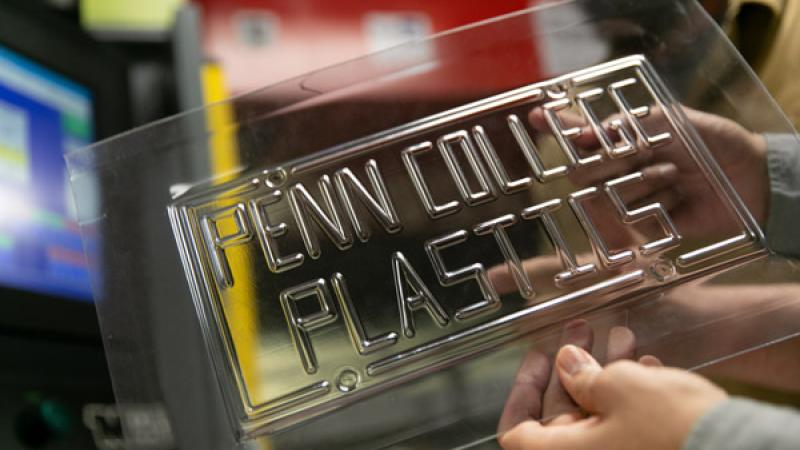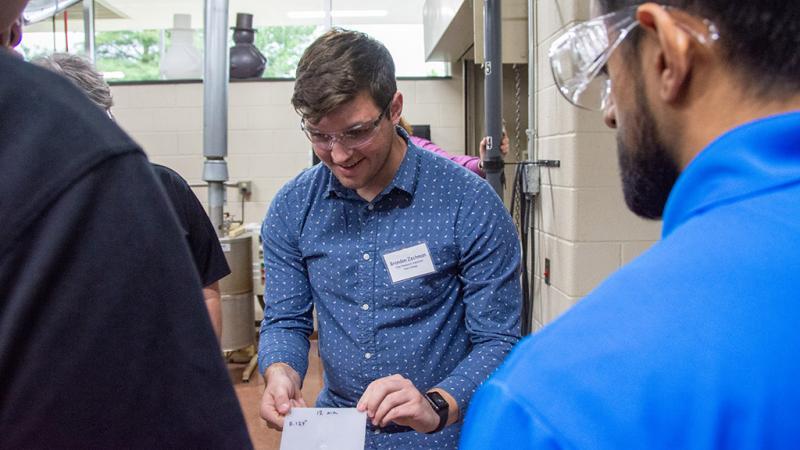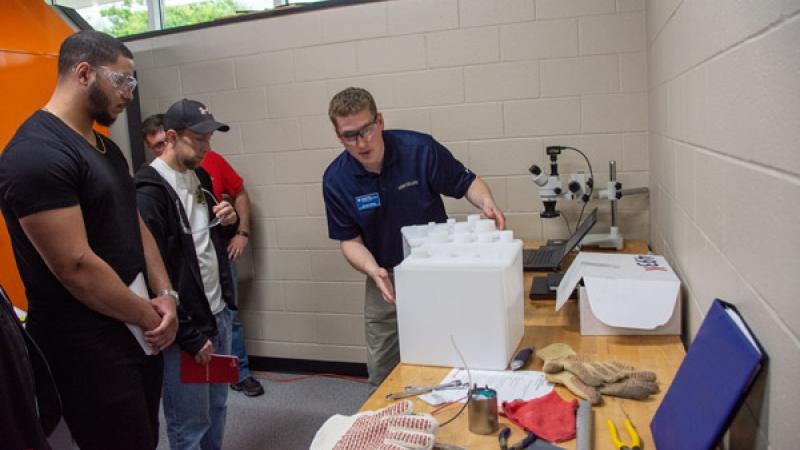“The possibilities are almost endless”
Published 09.18.2020

by BrandonZ
Plastics & Polymer Engineering Technology student
Penn College’s plastics and polymer engineering technology major led Brandon Zechman to calculate a formula for personal success: intellectual engagement + hands-on learning + supportive faculty and industry = “love at first sight.”
From his first exposure at a STEM summer camp through plastics professionals’ response to COVID-era manufacturing needs, Zechman has embraced the wide-open potential of his chosen career field. Zechman, who supplements his campus experience through membership in a Christian student organization and leisure time in the natural beauty of rural Pennsylvania, shares his balanced perspective with current students in this Q&A.
When did you first fall in love with Plastics and Polymer Engineering?
Growing up, I always had a dream to pursue a STEM career, but I truly had no idea what industry I was interested in. This changed once I attended an Engineering Summer Camp as well as an Open House at Penn College. During both of these events, I was exposed to Plastics and Polymer Engineering, and it was love at first sight. I enjoyed the perfect balance of hands-on work and intellectual studies, exercising both my mind and my hands. I also found great comfort in the job security that is offered with a major in Plastics Engineering. Most objects we use for everyday life contain some form of plastic or polymer, which will keep me in business someday!
What do you like most about Plastics and Polymer Engineering?
I like the diversity in my field the most out of all things. This field is incredibly broad, allowing a graduate of this program to do anything from making bottle caps, to making the fibers 10 times smaller than the human hair that can be used to create bioresorbable stents for heart surgeries. The possibilities of a graduate in Plastics and Polymer Engineering are almost endless.
Has the COVID pandemic changed the way you think about your field?
COVID, although a tragedy, allows for plastics manufacturing to be viewed in a new, more positive light. It truly opened my eyes as to how many options there are for someone working in a plastics manufacturing/engineering role to help the general public. I was able to witness many of the companies in my field shut down their main production lines in order to begin producing face shields, face masks and other virus-mitigation tools that are used today. My excitement to work in my field in order to benefit others has greatly increased through this demonstration of love through an unlikely community.
What is something cool you learned at Penn College or a fun project you worked on?
I have been graced with the ability to work in the plastics department via the PIRC (Plastics Innovation & Resource Center) as a research assistant. This has provided me with countless opportunities to work on interesting projects. My favorite project for work was most likely setting up an operating and shutdown procedure for the new Rotational Molding Machine. Apart from the PIRC, my favorite labs are the polymer synthesis labs, in which we get to create materials such as Polystyrene (PS), Polymethyl Methacrylate (PMMA or Acrylic), and many others.
How did the mix of practical experience and theory help you?
The Plastics and Polymer Engineering major has the absolute perfect balance of hands-on and theory-based teaching. In lecture we will be learning of a concept, breaking down plastics processing to the molecular level, understanding how different factors affect the material, and then how that property change will then affect your overall process. Most times, within a week of learning these concepts in lecture, we will head to the lab and actually run the experiments that support what was taught in lecture. This allows us to see issues from both the perspective of an operator, seeing only the effects downstream, and also the engineer, who views on the molecular level. We can then stitch these two incomplete views to gain a very in-depth understanding of all that is happening, from molecules to produced parts.
If someone were interested in Penn College, what might you tell them?
I would say that a choice to attend Penn College is a choice that would never be regretted. This college balances theory and lecture together perfectly to prepare you for any struggle that you may face in whatever industry you choose. Along with great in-house preparation of students, Penn College does an excellent job of helping students make connection with different employers in their desired fields, which makes getting an internship or job post-graduation much easier.
Can you tell us about the relationship you have with faculty?
The faculty at Penn College has only one desire: to see each and every student not only survive their time at college, but to thrive in it, as well as thrive for the remainder of their careers. Specifically, in the plastics program, I know without a doubt that all faculty members are here to support me, offer advice and guidance, and assist me in any academic issue, as well as some non-academic. I consider many of the faculty members in the Plastics Department some of my greatest role models, always showing love and grace to students, allowing me and others to grow into industry professionals who are highly sought after.
How would you explain the field of plastics and polymer technology to someone who has never heard of it?
Plastics and Polymer Engineering Technology is the study of how to optimize the process of making products out of different plastic materials. We focus on everything from the molecular science of polymer (how polymers are made, their specific properties and how they behave in a multitude of situations) to the general processing overview of how to best set up a machine cycle.
The coursework focuses mostly on the five main processes of the plastics industry (injection molding, rotational molding, blow molding, thermoforming and extrusion), but also on tangential topics such as composites (fiberglass, carbon fiber and Kevlar-reinforced products), polymer synthesis (making the materials), and quality engineering principles.
What advice would you give a high schooler looking into the field of plastics?
Try to challenge yourself in high school by taking classes that you will need later in college. Take a chemistry, physics, and even a calculus course (AP or dual enrollment, if possible). By having at least a slight background in these areas, you will be able to reach success a little easier than if not! Also, try to find a niche in the plastics field that you may really enjoy. Maybe it’s sustainable materials, medical polymers or just general production, but either way, it creates a driving force that will help keep your attention and work ethic at or above the amount necessary for success.
What interests or hobbies do you have outside of the classroom?
Outside of the classroom, I am heavily involved in a Christian organization here on campus called Cru. We are a community with a goal to captivate hearts, transform lives, and launch men and women into a lifelong relationship and journey with Jesus Christ, all through the power of the Gospel. In this club I am blessed to be the current president, as well as help lead in the areas of Men’s Ministry and Spiritual Outreach. Beyond that, I absolutely love to spend time in the outdoors. Whether it’s hunting, fishing, hiking or kayaking, I just love to be able to spend time admiring God’s beautiful creation.
How have Penn College industry connections enhanced your college experience?
Penn College does an excellent job of maintaining relationships with many companies in industry. This allows many students to have great ease in finding internships and, in turn, finding a career post-graduation. Because of these connections that the college has with industry professionals, I have been blessed with the opportunity to meet many different employers in my career field. Some excellent opportunities to meet these employers include the Career Fair, as well as my position at the PIRC. I have not yet taken an internship outside of the college, but that was not due to a lack of internships, but rather just my preference of what suited me better at the time.




